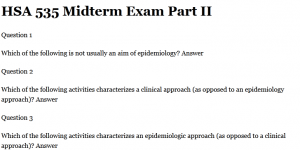Question 1
Which of the following is not usually an aim of epidemiology? Answer
Question 2
Which of the following activities characterizes a clinical approach (as opposed to an epidemiology approach)? Answer
Question 3
Which of the following activities characterizes an epidemiologic approach (as opposed to a clinical approach)? Answer
Question 4
The Epidemic Intelligence Service (EIS) is responsible for (give the best answer): Answer
Question 5
Cyclic variations in the occurrence of pneumonia and influenza mortality may reflect: Answer
both A and B Question 6
John Snow, author of Snow on Cholera: Answer
Question 7 In the Yearly Mortality Bill for 1632, consumption referred to: Answer
Question 8
Indicate the level of prevention that is represented by nutritional counseling for pregnant women Answer
Question 9
In 1900, the death rate per 100,000 members of the population for influenza and pneumonia (I & P) was 202.2; it was 22.4 in 2003. How much did the death rate due to I & P decline? Answer
Question 10
Indicate the level of prevention that is represented by screening for breast cancer Answer
Question 11
Using epidemiology for operational research involves: Answer
Question 12
The difference between primary and secondary prevention of disease is: Answer
Question 13
Indicate the level of prevention that is represented by half-way houses for persons recovering from addiction Answer
Question 14
Indicate the level of prevention that is represented by pasteurization of milk Answer
Question 15
An epidemiologic survey of roller-skating injuries in Metroville, a city with a population of 100,000 (during the midpoint of the year), produced the following data for a particular year:
Number of skaters in Metroville during any given month 12,000 Roller-skating injuries in Metroville 600 Total number of residents injured from roller-skating 1,800 Total number of deaths from roller-skating 90 Total number of deaths from all causes 900
The cause-specific mortality rate from roller-skating was: Answer
Question 16
Blood pressure measurements on adult males 30-39 years of age were obtained in a survey of a representative sample of Twin Cities households. To compare the frequency of hypertension in the white and non-white population surveyed, the most appropriate measure is the: Answer
Question 17
Determining workload and planning the scope of facilities and manpower needs, particularly for chronic disease. Is this a use for incidence or prevalence data? Answer
Question 18
Estimating the frequency of exposure. Is this a use for incidence or prevalence data? Answer
The risk of acquiring a given disease during a time period is best determined by: Answer
Question 20
To express the burden or extent of some condition or attribute in a population. Is this a use for incidence or prevalence data? Answer
Question 21
The fundamental tool for etiologic studies of both acute and chronic diseases. Is this a use for incidence or prevalence data? Answer
Question 22
Beach City has a rising population of 500,000 robust, fertile males and 450,000 robust, fertile females. If there were 4,000 live births, 3 fetal deaths, and 40 maternal deaths, what is the crude birth rate? Answer
Question 23
Age-specific and age-adjusted mortality rates by sex in the United States generally show the following sex differences: Answer
Question 24
A null hypothesis is most similar to which of the following? Answer
Question 25
Reasons for gender differences in mortality may include: Answer
Lung cancer mortality among women is increasing faster than among men. What factor(s) would most likely account for this increased cancer rate? Answer
Men are smoking more Question 27
Descriptive epidemiology has the following characteristics (Choose the incorrect option): Answer
Question 28
Studies of nativity and migration have reported that: Answer
Question 29 Which of the following statements most accurately expresses the downward-drift hypothesis for schizophrenia? Answer
Question 30
Which of Mill’s four canons suggests that there is an association between frequency of disease and the potency of a causative factor? Answer
